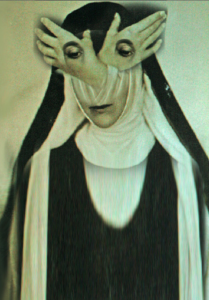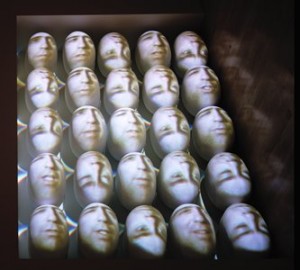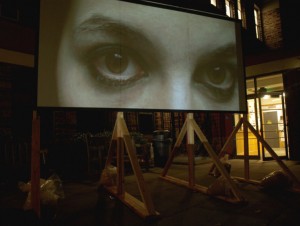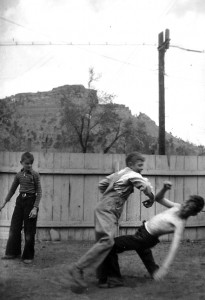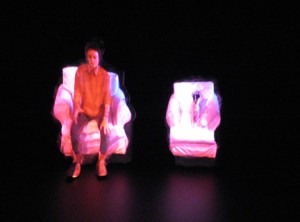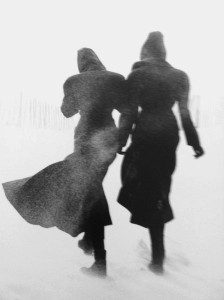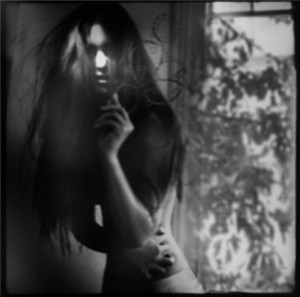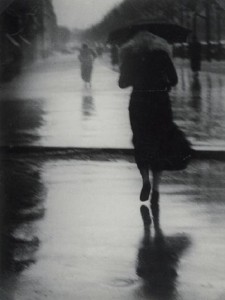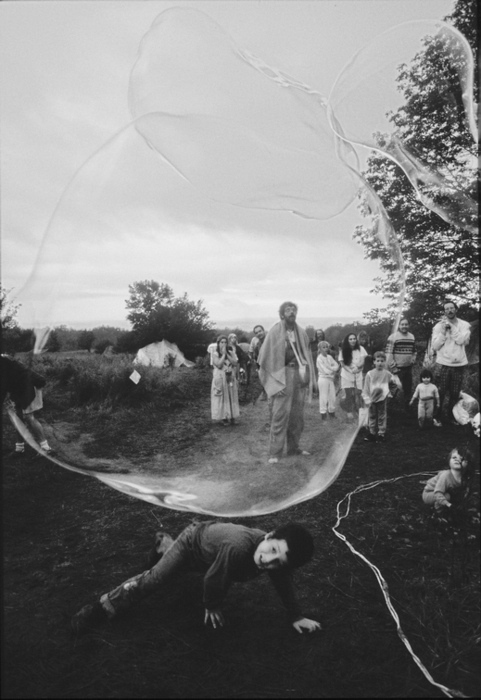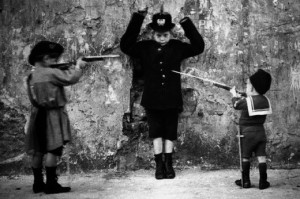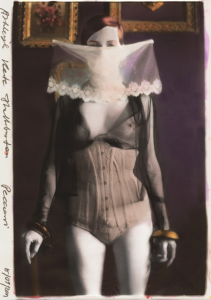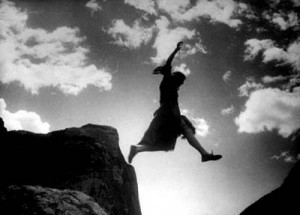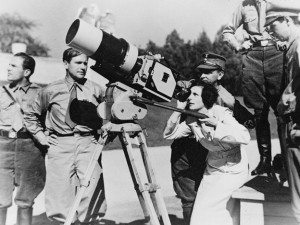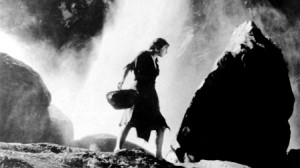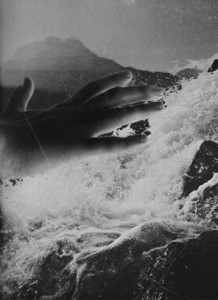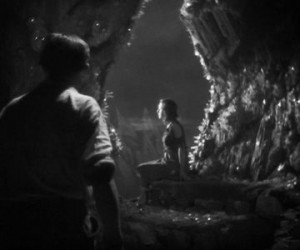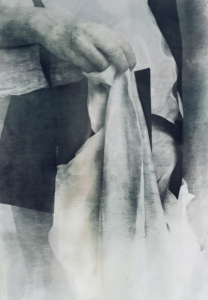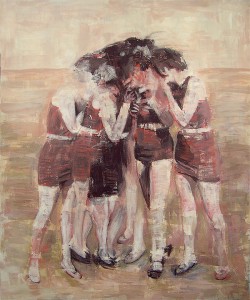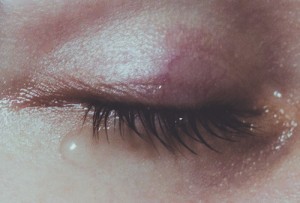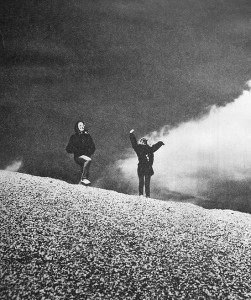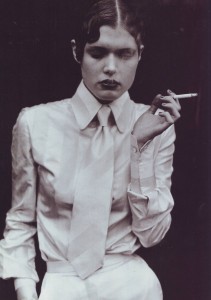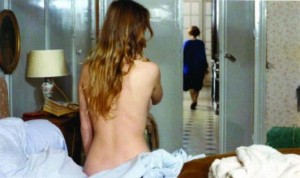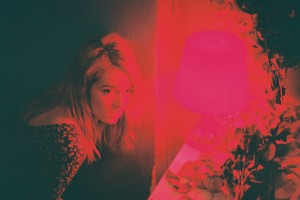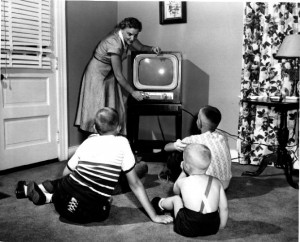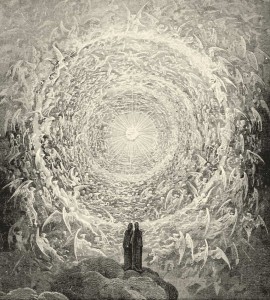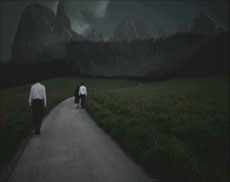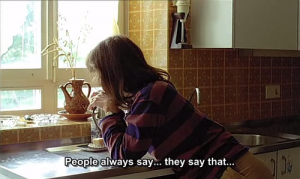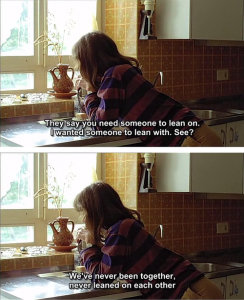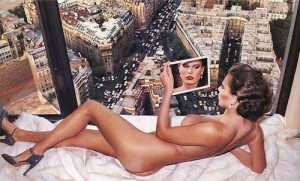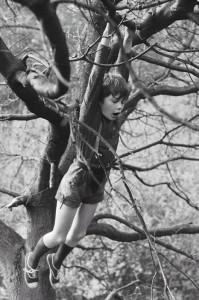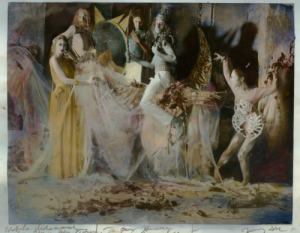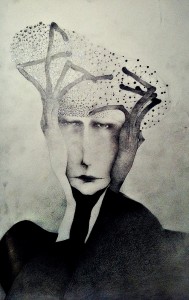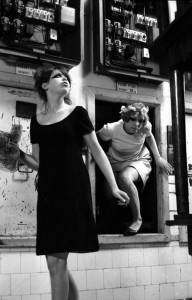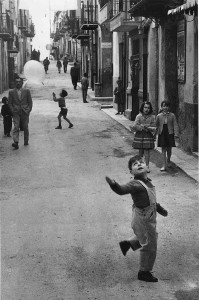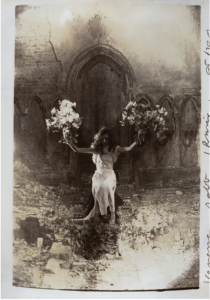
I know I know, it’s a hateful way to start, with a list, and worse than that, a collection of complaints. Artists it seems, we’re always chewing on a gripe, but when Lisa asked me for a few words on the latest screen brightener at Vtape, the first question that popped into my head, the one that’s stuck there like an unwelcome guest is this: Why are video installations so awful?
Here is my list. I’m sure you have your own.
1. Because boredom is the rule.
2. Because they are slaves to a single idea.
3. Because they insist that there is a limited amount of pleasure in the world, which must be carefully dispensed and rationed (or else: no laughing in the old age home.)
4. Because every pleasure has a cost, a tax which must be paid.
5. Because everywhere restraint is the watchword (Call it perceptual bondage, s/m for the eyes.)
6. Because you see them flickering out of the corner of your watch, approaching with anticipation only to find…
7. Because they refuse even the most elementary qualities of cinema (cinematography, montage).
8. Because repetition is repetition is repetition.
Most of the time when I see an installation, rich or poor, state museum, artist run center, the living room of a friend, I am accompanied by a voice, sounding out its tireless refrain: Is that all there is? Cowering beneath the force, the tyranny of a single idea, the divisions of mind and body may be strictly observed in the “real time” of these installations which run on into eternity, or at least until someone pulls the plug.
Of course there is no place for feelings. Feelings are not rigorous and exact. It’s a word that bounces off gallery walls like a squash ball, endlessly returning, this rigour. OK OK it’s dull, but it’s rigourously dull. The OED states: “The strict terms, application, or enforcement of some law, rule.” Rigour is the law’s adherence, the place of the installation is the demonstration of the code, and that doesn’t leave a lot of room for something as messy or infantile as emotions.
When I say “I love you,” I’m not exhausting the possibilities, the subsets and geometries of my feelings. Let alone yours. Never mind how long the erection lasts. Frequency of orgasm. Widening of pupils. This is a place beyond measurement and taxonomy, and in order to shore up the vertiginous odes to subjectivity that comprise the art “world” a masculinist conceptualism rules the day. That most of its beneficiaries are also male seems little coincidence. Ideas only please.
Imagine my surprise to find, bending through the rocky caves of a small fishing village in Portugal, a confection of installations which could not be summarized in a soundbyte or press release. The fest organizers in Vila Do Condé, cineastes all, care little for the barometers of fortune which inflate the tiny gestures of the few while banishing the squalls of the hopeful, the not-quite-good-enoughs. They leave behind the smoke screen of reputation, drawn by their tears and genitals and bodies. They are trying to answer questions of their own. What do I want? And this one: how is it possible to go on? Before the catalogue essay, the explanations, the public defense that underlies every exhibition and festival they open their hearts to embrace. So perhaps it’s no accident that here, on a windy afternoon in June, I encounter for the first time the work of Nicolas Dufranne.
Subject: rere
Date: Sun, 15 Feb 2004 09:57:19 -0500
From: jones@sympatico.ca
To: dot@xs4all.nl
last night this dream of you. we were back in that restaurant and about to kiss heavenly kiss and our faces moved together slowly until i am breathing you but not touching, looking instead into your eyes and finding the rest of the bar, the street outside, the city and country and everything that had ever happened to anyone, history waited inside your eyes while the voice whose voice was that said
oh
you ARE everything
In a national poll, Americans were asked what age marked the end of childhood. The answer? Twenty four. Nicolas Dufranne was twenty four when he made Moi, Mon Frere, La Fille. Still a student at L’Ecole Nationale Supérieure des Arts Visuels de la Cambre, he is one of those few, fortunate few, who begin their careers without the need for corrective lenses. When they arrive at the piano bench, the marble slab, the novel, these infant superpowers already have the knack.
It’s not so rare in the microverse of fringe movies, in part because the bar’s so low. When I was just off the starting blocks I felt surrounded by them, some were even friends, pulling their silver miles of emulsion from labs that glowed a little harder after these mini-Mozarts passed through the doors. I tried not to hate them. Nicolas is one of their number. As if Moi, Mon Frere, La Fille wasn’t enough, the next year he cops the honcho prize in Oberhausen, he’s already part of the stable of artistes at Gallery P, winner of the annual visual arts award from the province of Hainant. This year he turned twenty seven. Please try not to hate him. And let me make it easier for you. The first flush of greeting will pass, the hot embrace, the feeling of doing everything for the first time, the issue most of all, the steady burn that quickens the heart and leads the artist home, towards the perfect note, frame, word, arrangement. No other way occurs to them, unity and balance is their birthright, every step is the right one.
Here is the beginning of tragedy.
Of course it doesn’t last. Few artists stumble from one masterwork to another (even our failures are small), for most there are just a few years, maybe a single object after all those lonely weekends. Most art is kitchen prep, cutting the vegetables, learning the way it’s supposed to look on the plate. Sure we’re all dressed up with ambition (for the work! the work!) but knowing that it is more likely accident, blind chance, that will take us to heaven in the end. And something even larger than accident will have to occur for anyone to notice. It’s a small window, and Nicolas has already thrown his wide open. Pity him. Or else imagine him the exception.
The colour is black, the material is leather, the seduction is beauty, the justification is honesty, the aim is ecstasy, the fantasy is death.
Fascinating Fascism, Susan Sontag
Beginning in 1919, German director Arnold Fanck made a suite of mountain films which would set the stage for the messianic hero worship which would follow in the next decades. That eight features starred an indomitable young actress named Leni Riefenstahl was no accident. After this long apprenticeship she began her directing career with The Blue Light (1932), an alpine film of her own, before finding full employment with the Nazis.
The mountain film had certain reliable traits, tirelessly refrained, the ordeal of the climb for instance, a forbidding and deadly beauty, and longing. Most of all there is longing. Those peaks, moonlit, so far away. If only. If only we could. I could. How high can we get? The lessons of submission are clear, the joys, even the necessities, of becoming a body, and the hope that at last, civilization might be left behind.
Nicolas Dufranne has also made a mountain film. Images of mountains pierce his movie like a red thread, binding the wounds. How could they be so beautiful? Shrouded in mist, they are tintypes, more real than real, moving postcards which gain mystery by being revealed. The more often I see them, the less I know.
Like the films of Manck, these mountains are a character, not a backdrop or setting, nature’s thrust stage for emotions. And like the characters in the film, they don’t speak. They are a place of looking (literally: a look out). They loom over the characters, haunting their imagination in the first scenes, summoning them, insisting, until at last these dwarfed figures leave their level world, the even world, behind. They drive towards those forbidden peaks, as if towards desire. The dream world of Norway.
They are mountains. And they are pictures of mountains. They are never entered, held and scaled, no bodies will try to gain a foothold here. (You can’t land on a tangent, right?) No heroes and no superman. But still this lingering hint, this echo, of the fascist ideal. For all its refusal of effort, (Nicolas prefers a languorous horror, a sweatless suspension) these solemn peaks are a call from the past, siren song of the old body. To become a body. Could we go so far as to call it the fascism of love? The couple. Attraction. In this hideous allegory, this dumbstruck tale of romance’s cruel exclusions, Nicolas takes aim (How dare he? And so young!) at nothing less than desire itself.
Subject: re
Date: Fri, 20 Feb 2004 03:41:06 -0400
From: jones@sympatico.ca
To: dot@xs4all.nl
joanne said about you, did i mention this already, in those early days didn’t know you except in passing, she was giving thumbnail descripts of the soon-to-be daley crowd and as you were walking across potter to meet us at the dip she said that max is sweetness itself and yvonne is a bit off the beam and you are the one everyone falls in love with.
felt after i came back from alex that i had been returned to moments of body memory, still there waiting to be reclaimed, early moments of touch from my mother, but especially these punishment sessions which were invariably held in the kitchen. both doors closed leaving us in the arena together. i would pace the red and yellow tiles while she began a recitation of my misdeeds, which would expand, as the evening wore on, to include just about everything i had ever done or thought or wanted to do that was shaded the wrong way, and surely deserving of correction. so slow baby we have hours, we’ve got all night, until every nerve end is right up there on the skin opening they’re opening alright. that’s when we start changing size. i shrink into the vanishing point, while she would puff right up, filling the room like some great avenging angel (or were those horns i spied poking through the perm?) and then the hitting would start.
in these moments with alex, only moments, no long scenes on the rack or anything, no endless flog sessions in the local madam parlour, but moments are returning these memories now as pleasure. can you imagine? to convert these painful memories into pleasure, what an immensity of feeling and relief and knowing that is. though there was so much more than that, the failures, the stops and starts, but all leisurely, smoking in bed together, the long hours back scratching, and one night, at last, the drenching transcendent sex that hovered between us always. like a promise.
now low voltage days. have to work on up to the novel, which is waiting, that black hole of attention, and cara’s patient notes, page after page, all those words
thinking of you.
m
First of all this is a movie about love. There are two brothers. In his notes Nicolas writes “twins,” though only their dress (white shirt, dark trousers) appears identical. They don’t speak, they look, mostly at one another. They are learning how to look. How to be looked at. This is the way of love in Dufranne’s fable—it’s who you give your look to, like a gift, who you admit and who you couldn’t ever, not even once, no.
In the cinema or gallery or theater, we look through the frame, its four sides a reminder that seeing is always seeing less, that almost everything is cut out or ignored. Repressed. In the cinema we learn how to look. How do I look? The cinema answers in a shared seeing, it turns I Want into We Want. In the cinema my look is already yours. You see? We enter the frame, and then the frame enters us, we look out of it together, regarding ourselves, and each other.
oh
you ARE everything
Two brothers travel to Norway, once inseparable, as soon as they begin their journey a woman appears. La Fille. In the back of the car, slouching in symmetry. Of course, this mirror was once reserved for the brothers, but that was before they set off for the mountains. Before she occurs to them. What happens next, is it inevitable? One brother is humiliated and left behind, in this universe there is only room for couples. He is replaced by la fille. Once again the world of two is restored. The world of love. And looking.
Are you seeing anyone? Usual question for the lonely at heart. It means: are you dating, fucking, falling in love? Seeing and love are the same after all. Nicolas’ stunned mutes do not have words to lubricate their experience. What connects them is their look. How do I look? And us. How do we look?
Subject: Re:baptized
Date: Sun, 25 Mar 2004 17:59:40 -0800
From: dot@xs4all.nl
To: jones@sympatico.ca
those are two just moments. i’m certainly not baptized wet in a pussy’s afterglow, not these days. what a beautiful week you had with alex. i think you must be home now, not aching too much i hope. still wearing the marks. those perfect delicate wounds we try to make last. this woman stanley says: we say “love is blind” when we’ve forgotten how. we know love. in the steam baths or an apartment in amsterdam, a brief moment, a hotel room. i met this man last winter and within hours we just fell into each other, we opened our fierce, beautiful, dirty tender selves to each other, and later, bodies wet and entwined, he said i love you, he said, i don’t even know you but i love you, and i froze….this is a man who appears to be exactly who he is, he said, tell me you love me. he wasn’t ordering or prompting me; he was just giving me permission, and i said it, and then it was like this floodgate opening, like all the moments i had felt love and said nothing, came rushing up. and it was a love that was not about posession or wanting or consequence; it was about beholding this person before me, this stranger, and this thing that had happened to us, this small miracle that could never be repeated.
i can’t believe that i might have taught you anything. but at least i think i can encourage you to keep going, without a script. without so much fear. this woman stanley, who is, among other things, a mother, fixer of cars and occasional sex worker said that she’s never felt shame. and that just went up my spine, the idea of living with NO SHAME. sorry for these nonsequiters. how are you? you do sound baptized, or at least highly electromagnetically charged. do street lamps short cirucuit when you walk by, appliances, VCRs, clocks???
Does romantic love belong in sets of two? Beer is packaged in multiples of six, toothpicks by the hundred box, toilet paper in four-packs. I wonder when it was decided that couples would provide the optimal unit of pleasure and love? Exclusive, all rights reserved, till death do us part, and copyright protected. What could be more rigorous than monogamy and marriage? First the rigour and then the mortis. The OED states: “The strict terms, application, or enforcement of some law, rule.” A rigorous love, a love by the book, according to code. I love you, I testify, I do.
Among my shrinking cache of acquaintances there a few long distance runners in the relationship world. They have not managed out of decency, mutual respect and kindness, these qualities have all come into play sure enough, but some kind of hope had to be eaten first, some private and forbidden longing left behind, the grand schemes abandoned. Not to mention sex. Not to mention having your body ripped open and packed with unimaginable pleasures and put back together again in strange new combinations. Not to mention sex. Not after all these years.
I know it’s cruel but I can’t help it. I sleep so long they always get up before I do. When they look over at me, still in the thrall of dreams which will not be remembered, I know what’s going through their minds. I know because I’d be thinking just the same. Lovely as you are. The way you let the words hang off your mouth so I can taste them, one at a time. Your perfect fingers. None of that matters this morning. Because this morning they’re thinking: is that all there is?
Would these even be questions if I hadn’t just finished with Jo? If all my friends hadn’t just crawled up out of their own Jos, or for the ones who haven’t, still busy scheming, counting down their final hours with once loves until the day when soon, so soon, they would find us on the other side of the family compact, on the far shore of love, learning to open and feel the pain of it and open again, putting our queer shoulders to the wheel of this bruising, beautiful, sad and perfect love. OK not perfect. We’ve had to leave that behind too. But I just want to know, never mind the rest, skip it by all means, hoped only to ask you this question: Won’t you join us?
The imperfect is our paradise. (W Stevens)
Nicolas Dufranne videos
Untitled 15′ min b/w 2000
Moi, Mon Frere, La Fille 14′ 2001
Vacances 14.5′ 2002
La Disparition 6′ 2003
The videos of Nicolas Dufranne are available from:
Galerie P
Rue des Eperonniers 71-1000 Brussels, Belgium
telephone: 32.2.542.11.12 email: info@galeriep.be
web: www.galeriep.be
Originally published in: Surface Tension (Essays Commissioned for the Vtape Video Salon), 2005
